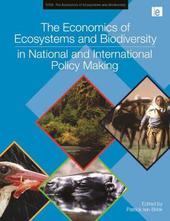
|
The Economics of Ecosystems and Biodiversity in National and International Policy Making
Hardback
Main Details
| Title |
The Economics of Ecosystems and Biodiversity in National and International Policy Making
|
| Authors and Contributors |
By (author) United Nations Environment Programme
|
|
Edited by Patrick ten Brink
|
| Physical Properties |
| Format:Hardback | | Pages:390 | | Dimensions(mm): Height 246,Width 189 |
|
| Category/Genre | Environmental economics
Applied ecology |
|---|
| ISBN/Barcode |
9781849712507
|
| Classifications | Dewey:333.7 |
|---|
| Audience | | Tertiary Education (US: College) | | Professional & Vocational | |
|---|
| Illustrations |
ill., maps
|
|
Publishing Details |
| Publisher |
Taylor & Francis Ltd
|
| Imprint |
Earthscan Ltd
|
| Publication Date |
23 February 2011 |
| Publication Country |
United Kingdom
|
Description
The Economics of Ecosystems and Biodiversity (TEEB) study is a major international initiative drawing attention to local, national and global economic benefits of biodiversity, to highlight the growing costs of biodiversity loss and ecosystem degradation, the benefits of investing in natural capital, and to draw together expertise from the fields of science, economics and policy to enable practical actions. Drawing on a team of more than one hundred authors and reviewers, this book demonstrates the value of ecosystems and biodiversity to the economy, society and individuals. It underlines the urgency of strategic policy making and action at national and international levels, and presents a rich evidence base of policies and instruments in use around the world and a wide range of innovative solutions. It highlights the need for new public policy to reflect the appreciation that public goods and social benefits are often overlooked and that we need a transition to decision making which integrates the many values of nature across policy sectors. It explores the range of instruments to reward those offering ecosystem service benefits, such as water provision and climate regulation. It looks at fiscal and regulatory instruments to reduce the incentives of those running down our natural capital, and at reforming subsidies such that they respond to current and future priorities. The authors also consider two major areas of investment in natural capital -- protected areas and investment in restoration. Overall the book underlines the needs and ways to transform our approach to natural capital, and demonstrates how we can practically take into account the value of ecosystems and biodiversity in policy decisions -- at national and international levels -- to promote the protection of our environment and contribute to a sustainable economy and to the wellbeing of societies.
Author Biography
This volume is an output of TEEB: The Economics of Ecosystems and Biodiversity study and has been edited by Patrick ten Brink, Senior Fellow at the Institute for European Environmental Policy (IEEP) and head of the Brussels office. TEEB is hosted by the United Nations Environment Programme (UNEP) and supported by the European Commission, the German Federal Ministry for the Environment (BMU) and the UK Department for Environment, Food and Rural Affairs (DEFRA), recently joined by Norway's Ministry for Foreign Affairs, The Netherlands' Ministry of Housing (VROM), the UK Department for International Development (DFID) and also the Swedish International Development Cooperation Agency (SIDA). The study leader is Pavan Sukhdev, who is also Special Adviser - Green Economy Initiative, UNEP.
Reviews'This work is a landmark. It shows not only that we have been extraordinarily wasteful, destructive and inefficient in our treatment of the natural environment but also how careful analysis and measurement can help us change our ways towards a more productive and responsible relationship with our environment. It provides a fundamental contribution which shows how careful attention to ecosystems and biodiversity can help guide our response to the two defining challenges of our century: managing climate change and overcoming poverty.' Professor Nicholas Stern, London School of Economics 'The [TEEB] project should show us all how expensive the global destruction of the natural world has become and - it is hoped - persuade us to slow down.' The Guardian 'A very important and timely book, and an invaluable resource for assisting countries in implementing the Strategic Plan for Biodiversity 2011-2020, adopted by consensus at the 2010 world biodiversity summit in Japan.' Dr. Ahmed Djoghlaf, Executive Secretary of the Convention on Biological Diversity (CBD) 'The Economics of Ecosystems and Biodiversity (TEEB) has been crucial in developing the way we think about biodiversity. It is important that policy makers are not only concerned with protecting vulnerable species, but that they recognise the value of nature, and its contribution to our general wellbeing and economy. We need to understand the true cost of losing what nature gives us for free, and integrate this into our decision making across government, business and society. At the national and international level TEEB for Policy Makers helps us think about how this can be done.' Caroline Spelman, MP, Secretary of State for Environment, Food and Rural Affairs, United Kingdom (UK) 'The TEEB approach in researching thei? formerly ignored contributions to economies around the world provided by ecosystems and biodiversity is the most ground-breaking work in the economics profession ... TEEB , together with similar research can move the world beyond economics and GDP toward more sustainable and equitablei? measures ofi? genuine human development.' Hazel Henderson, President of Ethical Markets Media (USA and Brazil)
|